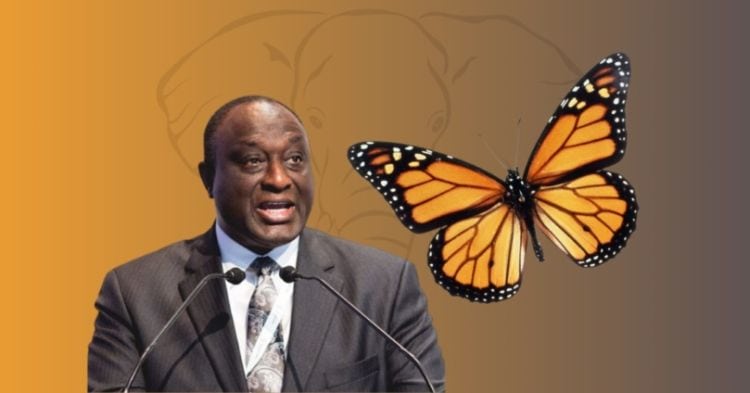Rebranded United Party Seen as Strategic Move to Woo Disgruntled NPP Members

Political Analyst Calls United Party Rebrand a “Masterstroke”
Political analyst Dr. Jonathan Asante Otchere has described the Movement for Change’s rebranding into the United Party (UP Plus) as a calculated and potentially game-changing move in Ghana’s evolving political landscape.
Speaking on Citi FM’s Eyewitness on Thursday, October 16, 2025, Dr. Otchere said the new name is more than a cosmetic change it is a deliberate strategy aimed at drawing support from elements within the New Patriotic Party (NPP) who may feel disillusioned or sidelined as the country approaches the 2028 general elections.
“In my view, it is a political masterstroke,” he said. “The name will resonate strongly with the traditional base of the NPP, particularly its hardliners and those who identify deeply with its historical roots.”
Dr. Otchere explained that the adoption of the United Party name evokes deep historical symbolism in Ghana’s political tradition. The original United Party, formed in 1957, was the forerunner of the modern-day New Patriotic Party. By reclaiming that identity, he said, Alan Kyerematen’s group is signaling continuity with a legacy that still holds emotional appeal among older conservatives and members who feel alienated by current NPP leadership.
“The rebranded UP provides a sort of political homecoming for disgruntled NPP members,” Dr. Otchere noted. “It’s a way of saying, ‘This is where it all began, and you can come back home.’ That emotional connection could prove powerful in mobilizing support.”
He added that the decision positions the UP Plus as a potential third force capable of challenging Ghana’s long-standing two-party dominance between the NPP and the National Democratic Congress (NDC).

The rebranding is the latest in a series of moves by Alan Kyerematen, former Minister of Trade and Industry, who resigned from the NPP in 2023 to launch the Movement for Change. His decision came after withdrawing from the NPP presidential race, citing what he described as entrenched factionalism and unfair treatment within the party.
Kyerematen’s movement initially positioned itself as a centrist alternative promoting youth empowerment, industrial transformation, and inclusive governance. However, the transition to the United Party identity appears aimed at strengthening its base among right-leaning voters while tapping into the NPP’s historical and ideological heritage.
Political observers suggest that the rebrand may help the party attract core NPP supporters dissatisfied with the government’s handling of the economy, rising cost of living, and perceived internal divisions.
The rebranding carries broader implications for Ghana’s multiparty democracy, which has long been dominated by the NPP and the NDC. Both parties have alternated power since 1992, leaving limited room for third parties to gain traction.
If successful, the United Party could become Ghana’s most credible third political force in decades, challenging the duopoly that has defined national politics for over 30 years.
According to data from the Electoral Commission of Ghana, minor parties together accounted for less than 2% of total votes cast in the 2020 general elections. This pattern reflects how difficult it is for alternative parties to gain national recognition and organizational strength. Analysts say that leveraging a historically resonant name like “United Party” could give Kyerematen’s movement a symbolic edge and help it cross that threshold.
Dr. Otchere, however, cautioned that branding alone will not guarantee electoral success. “Names can inspire nostalgia, but what will ultimately determine their success is the strength of their organization, policy clarity, and grassroots mobilisation,” he said.

While supporters of the rebranding have praised the move as visionary, some NPP loyalists view it as an attempt to fragment the party’s base ahead of the next elections. They argue that invoking the “United Party” heritage may confuse voters or blur ideological lines between the NPP and the new UP Plus.
Political scientists also point out that Ghana’s first-past-the-post electoral system poses structural barriers to smaller parties, making it difficult for new entrants to win parliamentary seats or presidential votes without broad nationwide appeal.
Nonetheless, some civil society groups have welcomed the development as a sign of growing political pluralism. They note that more competitive options could foster accountability and policy innovation if the United Party manages to sustain momentum.
For now, analysts say it remains to be seen whether the United Party can transform from a symbolic revival of political history into a substantive national movement capable of breaking Ghana’s two-party cycle.
The coming months will likely test the party’s ability to attract grassroots membership, raise campaign funds, and build a credible national structure. Its performance in local elections or by-elections before 2028 may provide early indicators of its viability.
As Ghana’s political field evolves, the United Party’s emergence underscores the fluid nature of voter loyalty and the growing appetite for alternatives within the country’s democratic space.
Read also: Free SHS Extension to Private Schools Marks Key Shift in Ghana’s Education Policy
